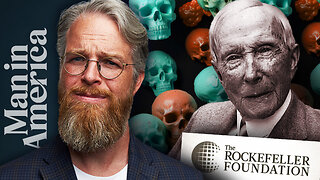Premium Only Content

Episode 1932: Saints Behaving Badly
"Saints Behaving Badly" by Thomas J. Craughwell first published in 2006 is a fascinating exploration of the lives of various saints throughout history who, despite their eventual canonization, led lives filled with struggles, imperfections, and even scandalous behavior at times. The book takes a refreshing and often humorous approach to presenting the human side of these revered figures, highlighting their flaws, mistakes, and personal challenges while also emphasizing their ultimate spiritual triumphs.
Here's an in-depth overview of the book:
Introduction to the Concept: Craughwell sets the stage by introducing the concept that many saints were not always the pious and saintly figures we often perceive them to be. Instead, they were real people who faced temptations, made mistakes, and sometimes engaged in behavior that would seem contradictory to their eventual status as saints.
In the introduction sets the stage for the exploration of saints' lives by introducing the central concept of the book: that many saints were not always the paragons of virtue and holiness that they are often depicted as being. Instead, Craughwell asserts that saints were human beings who faced struggles, temptations, and moral dilemmas, just like anyone else.
Craughwell challenges the idealized image of saints as perfect and flawless individuals, arguing that such a portrayal can sometimes make them seem distant and unrelatable to ordinary people. By acknowledging the imperfections and struggles of the saints, Craughwell aims to humanize them and make their stories more accessible and relevant to contemporary readers.
Through humor and wit, he emphasizes the paradoxical nature of sanctity, suggesting that even those who exhibit less-than-saintly behavior at times can still achieve spiritual greatness. He introduces the idea that the path to sainthood is often marked by twists and turns, setbacks and triumphs, and moments of weakness as well as moments of strength.
Overall, the introduction serves as a primer for the rest of the book, preparing readers to approach the saints' stories with an open mind and a willingness to confront the complexities of their lives. It invites readers to reconsider their preconceived notions of what it means to be a saint and encourages them to find inspiration in the messy, imperfect, and ultimately redemptive journeys of these remarkable individuals.
Individual Saint Profiles: The bulk of the book consists of profiles of various saints, each dedicated to exploring the complexities of their lives. Craughwell selects a diverse range of saints from different historical periods, cultures, and backgrounds. Some of the saints featured in the book include Augustine of Hippo, Mary of Egypt, Francis of Assisi, and Teresa of Avila, among others and I will provide you with the complete list in case you buy the book and want to focus on a particular saint.
Diverse Selection: He selects saints from different historical periods, cultures, and backgrounds, providing a broad spectrum of experiences to explore. This diversity allows readers to see the various themes of struggle and redemption manifested in various contexts.
In-depth Analysis: Each profile delves into the life of the saint in detail, examining key events, relationships, and decisions that shaped their journey. Craughwell provides historical context to help readers understand the societal and cultural influences that shaped the saint's behavior.
Emphasis on Transformation: Despite their imperfections, each saint undergoes a transformative journey towards spiritual growth and redemption. Craughwell emphasizes the moments of grace, conversion, and heroic virtue that ultimately define their lives and lead to their recognition as saints.
Humorous Anecdotes: Craughwell infuses the profiles with humor and wit, using entertaining anecdotes and amusing observations to engage readers and bring the saints' stories to life. This lighthearted approach helps to make the sometimes dense material more accessible and enjoyable to read.
Reflective Questions: Throughout each profile, Craughwell encourages readers to reflect on the lessons that can be learned from the saint's experiences. He poses thought-provoking questions that invite readers to consider how the saint's struggles and triumphs might resonate with their own lives.
Inspiration for Modern Readers: While the saints lived in different times and faced different challenges, Craughwell highlights the timeless wisdom and relevance of their stories for contemporary readers. He draws parallels between the saints' experiences and modern-day struggles, offering insights and inspiration for readers seeking to deepen their own spiritual journey.
Highlighting Moral Failings: Throughout the book, Craughwell discusses various moral failings and character flaws exhibited by the saints. This may include instances of pride, jealousy, anger, lust, or other vices commonly associated with human nature. By shining a light on these aspects of the saints' lives, Craughwell emphasizes their humanity and relatability.
Contextual Understanding: While acknowledging the saints' imperfections, Craughwell also provides context to help readers understand why they may have acted the way they did. He explores the social, cultural, and historical factors that influenced the saints' behavior, showing that their actions were often shaped by the circumstances in which they lived.
Complexity of Character: Craughwell presents the saints as complex and multifaceted individuals, rather than one-dimensional figures of perfection. He acknowledges that they were capable of both great acts of heroism and moments of weakness, and he encourages readers to grapple with the complexity of their character.
Path to Redemption: Despite their imperfections, each saint ultimately embarks on a journey of spiritual growth and transformation. Craughwell highlights the moments of grace, conversion, and repentance that mark their path to redemption, emphasizing that even the most flawed individuals have the capacity for holiness.
Historical Background: Craughwell begins by providing readers with a historical overview of the time period in which each saint lived. He discusses the political, social, and religious landscape of the era, highlighting key events and developments that shaped the context in which the saint's life unfolded.
Cultural Influences: Craughwell explores the cultural influences that impacted the saints' lives and choices. This may include factors such as prevailing attitudes towards morality, gender roles, family dynamics, and societal expectations. By examining these cultural norms, Craughwell helps readers understand why the saints may have behaved in certain ways.
Religious Beliefs: Religion played a significant role in the lives of the saints, and Craughwell delves into the religious beliefs and practices of the time. He discusses the theological framework within which the saints operated, including their understanding of sin, virtue, grace, and salvation. This helps readers appreciate the religious motivations behind the saints' actions.
Personal Circumstances: Craughwell also considers the personal circumstances of each saint, such as their upbringing, education, family background, and life experiences. He explores how these factors shaped the saint's personality, values, and worldview, providing insight into their motivations and decision-making processes.
Challenges and Adversities: Many of the saints faced significant challenges and adversities in their lives, ranging from poverty and illness to persecution and conflict. Craughwell examines how these challenges influenced the saints' behavior and shaped their spiritual journey. He shows that the saints often drew strength and inspiration from their struggles, using them as opportunities for growth and transformation.
Moment of Grace: Throughout the book, Craughwell highlights key moments of grace and spiritual awakening that marked turning points in the lives of the saints. These moments often involved a profound encounter with God's love and mercy, prompting the saints to reassess their lives and embark on a journey of repentance and renewal.
Conversion Experience: Many of the saints experienced a dramatic conversion or spiritual awakening that transformed their lives. Craughwell explores these conversion experiences in detail, showing how they led the saints to turn away from sin and embrace a life of virtue and holiness. These conversions often involved a radical reorientation of the saint's priorities, values, and goals.
Acts of Virtue and Heroism: As the saints progressed on their spiritual journey, they began to exhibit acts of virtue and heroism that reflected their inner transformation. Craughwell recounts these acts of love, compassion, courage, and selflessness, illustrating how the saints' lives became increasingly aligned with the values of the Gospel.
Impact on Others: The transformation of the saints had a profound impact on those around them. Craughwell explores how the saints' example inspired others to seek conversion and pursue lives of holiness. He highlights the saints' role as spiritual mentors and guides, showing how their witness continues to inspire and challenge believers today.
Eternal Reward: Ultimately, the saints were rewarded for their fidelity and perseverance with eternal life in heaven. Craughwell reflects on the saints' legacy and the enduring impact of their witness, emphasizing that their stories serve as a source of hope and encouragement for all who strive to follow Christ.
Reflection and Application: Throughout the book, Craughwell encourages readers to reflect on the lessons that can be learned from the saints' experiences. He highlights the universal themes of sin, repentance, forgiveness, and the possibility of redemption, inviting readers to apply these insights to their own lives.
Provocative Questions: Throughout the book, Craughwell poses thought-provoking questions that prompt readers to reflect on the saints' experiences and consider how they relate to their own lives. These questions encourage readers to engage critically with the material and to draw connections between the saints' struggles and triumphs and their own experiences.
Personal Relevance: Craughwell emphasizes the personal relevance of the saints' stories, highlighting the universal themes of sin, redemption, forgiveness, and grace that resonate across time and culture. He encourages readers to consider how the saints' experiences mirror their own struggles and challenges, fostering a sense of empathy and connection.
Practical Application: In addition to reflection, Craughwell offers practical suggestions for how readers can apply the lessons learned from the saints' lives to their own spiritual practice. This may include strategies for overcoming temptation, cultivating virtue, deepening prayer life, or seeking reconciliation with God and others.
Poking Fun at Stereotypes: Craughwell often pokes fun at the stereotypes and misconceptions surrounding the saints, challenging readers to reconsider their preconceived notions of what it means to be holy. By injecting humor into the narrative, he encourages readers to approach the saints' stories with an open mind and a sense of curiosity.
The saints discussed are:
St. Francis Xavier
St. Teresa Benedicta of the Cross (Edith Stein)
St. John Vianney
St. Therese of Lisieux
St. Thomas More
St. Mary Magdalene
St. Moses the Ethiopian
St. Benedict Joseph Labre
St. Marianne Cope
St. Ignatius of Antioch
St. Pelagia the Penitent
St. Augustine of Hippo
St. Francis of Assisi
St. Mary of Egypt
St. Jerome
St. Catherine of Siena
St. Teresa of Avila
St. Ignatius of Loyola
St. Benedict of Nursia
St. Thomas Aquinas
St. Margaret of Cortona
St. Olga of Kiev
St. Vincent de Paul
St. Camillus de Lellis
St. Peter Claver
Overall, Craughwell's use of humor and wit in "Saints Behaving Badly" adds depth and richness to the narrative, making the saints' stories more engaging, relatable, and enjoyable to read. By infusing the text with humor, Craughwell invites readers to approach the saints' lives with a sense of curiosity, wonder, and appreciation for the quirky and often surprising aspects of their personalities.
-
 2:10:26
2:10:26
Badlands Media
10 hours agoDevolution Power Hour Ep. 383
49.2K6 -
 3:17:28
3:17:28
TimcastIRL
5 hours agoTrans Shooter Targets Catholic Kids In Mass Shooting, Leftists Reject Prayers | Timcast IRL
210K54 -
 1:31:29
1:31:29
Brandon Gentile
1 day ago25 Year Wall Street INSIDER: $1M Bitcoin Soon Is Just The START
12K -
 LIVE
LIVE
SpartakusLIVE
6 hours ago#1 Birthday Boy Celebrates with MASSIVE and HUGE 4.8-Hour Stream
313 watching -
 55:54
55:54
Man in America
8 hours agoFrom Oil Barons to Pill Pushers: The Rockefeller War on Health w/ Jeff Adam
36.3K3 -
 3:02:18
3:02:18
Barry Cunningham
5 hours agoBREAKING NEWS: PRESIDENT TRUMP THIS INSANITY MUST END NOW!
82.9K151 -
 DVR
DVR
StevieTLIVE
4 hours agoWednesday Warzone Solo HYPE #1 Mullet on Rumble
29.6K -
 5:58
5:58
Mrgunsngear
5 hours ago $2.88 earnedBreaking: The New Republican Party Chairman Is Anti 2nd Amendment
23.2K8 -
 2:28:35
2:28:35
Geeks + Gamers
5 hours agoGeeks+Gamers Play- MARIO KART WORLD
24.6K -
![(8/27/2025) | SG Sits Down Again w/ Sam Anthony of [Your]News: Progress Reports on Securing "We The People" Citizen Journalism](https://1a-1791.com/video/fww1/d1/s8/6/G/L/3/c/GL3cz.0kob.1.jpg) 29:34
29:34
QNewsPatriot
5 hours ago(8/27/2025) | SG Sits Down Again w/ Sam Anthony of [Your]News: Progress Reports on Securing "We The People" Citizen Journalism
18.5K2